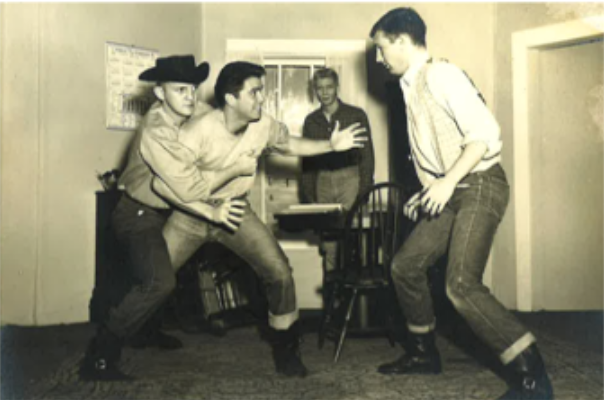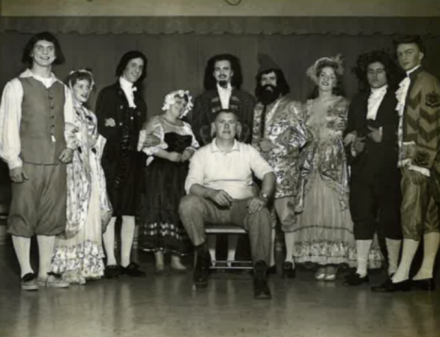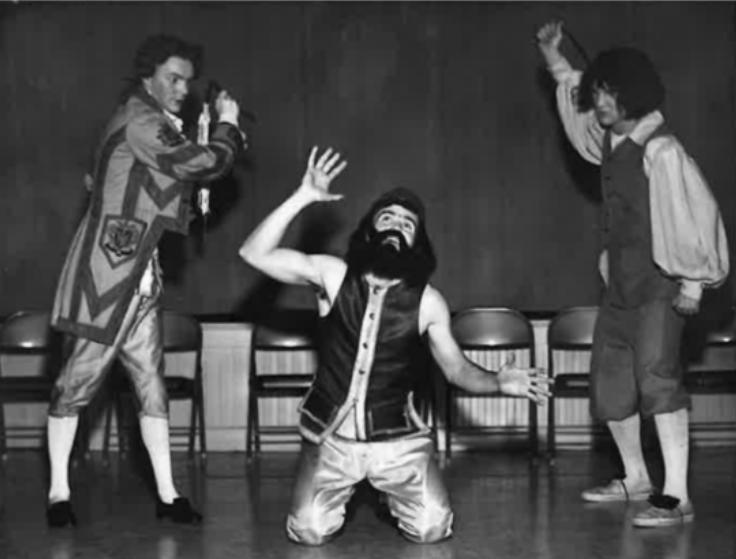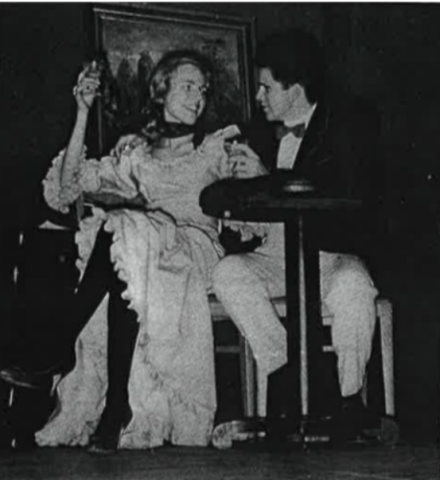Bill Troutman’s journey to Elon University is a story of happenstance—starting with his military service and a chance encounter that led him to discover a passion for theater. At Elon, he found lifelong friends and a life-changing experience that shaped his future.
Bill Troutman ’61 carved his own path to Elon University. Unlike many of his classmates, he didn’t go on college tours or have a parent who was an alumnus, he found Elon through a chance encounter.
In November 1953, while serving in the military aboard of ship of over 5,000 other U.S. Army servicemen, Troutman recalls hearing about Elon for the first time. Below deck with the other soldiers, he was enjoying a movie when intermission arrived and Troutman stood up to stretch his legs and chat with those around him. It was during this moment that he encountered someone who would profoundly impact his life: an unknown solider who shared his love for baseball.
“It was during my brief conversation with this soldier, whose name I don’t remember and who I never saw again, who first spoke the words ‘Elon College’ to me. He casually referenced this revered small college in North Carolina, that just happened to have a strong baseball program,” said Troutman.

Little did Troutman know Elon would become a central part of his life. Six years later, in 1959, Troutman was able to transfer credits from Penn State University to attend Elon. Having received financial assistance through the GI Bill, Troutman was able to afford the college of his dreams. He recalls feeling gracious for the opportunity to attend college, as many people he knew couldn’t afford it.
“As a small-town farm boy, growing up in Lewisburg, Pennsylvania and one of seven children, financial assistance was the difference between a college education or not,” he said.
Troutman remembers feeling genuinely accepted from the moment he stepped foot on campus to unpack his belongings on the second floor of Carolina residence hall. Even being a few years older than his classmates, Troutman still felt the kindness and support of his peers.
“These relationships served as my family away from home and opened the door for a place in the campus community. Classmates, professors, and campus employees offered me an opportunity ‘to belong’, and I accepted it,” he said.
To pay for college, Troutman worked in the school cafeteria. He learned many useful skills there, like responsibility and hard work, but his biggest takeaway was the people that he met along the way.
“I was privileged to encounter one of the most remarkable, endearing, one-in-a-million individuals I have ever met,” said Troutman, about a woman he referred to as Miss Mary. “A hug from her would fuel my energy tank for the whole day. For those at Elon who write its history, she deserves more than a paragraph.”
At the time, Troutman recalls Miss Mary being one of the few African American personnel working at the school. She was largely responsible for the smooth running of the school cafeteria that served an all-white student body. Troutman remembers her larger-than-life presence and personality, which he describes as having, “an enormously positive impact on my collegiate career.”
While at Elon, Troutman had many interests and passions such as history, English, and competitive athletics. It wasn’t until another cafeteria worker, Sharon Glew, introduced him to the arts that he found his real calling. His first experience with the arts was in an oral interpretation class taught by husband and wife, Mel and Betty Wooten.
“In retrospect, it was their patience, instruction, guidance, positive attitude, encouragement, and supportive friendship that led me to become excited and interested in performing arts,” he explains.

The arts were where Troutman thrived, he was able to play several lead roles and showcase his talents. He notes that the most demanding role of Sganerelle in Moliere’s “The Doctor in Spite of Himself” was also the most rewarding. The director, Ray Day, created an amazing show Troutman was proud to be a part of. In February of 1961, all of his hard work paid off when he won the Jerry Dalton Strader Award ‘Eppie’ for his outstanding performance as Sganerelle. This award helped him solidify his passion for the arts as well as validate the sacrifices and hard work he put in to succeed in the theater.
“The impact of my relationships with professors Mel and Betty Wooten, director Ray Day and the student members of the Elon Players cannot be measured. They will remain as life-altering treasures,” he says.

A memory Troutman reflects on fondly during his time at Elon is that of his Spanish professor, Francis Muldrow. She pushed him to succeed and never gave up on him during his time at Elon.
“Her message was that if I was capable of memorizing so many pages of dialogue, there was no excuse for me being a ‘C’ grade Spanish student. She expressed her disappointment and challenged me to better myself. She arranged for a study partner in Alan Foster and thanks to them I raised my grade to a responsible ‘B’,” he said.

Troutman built himself a home at Elon and found role models, friends, and mentors.
“Now in 2025, at the age of 92, retired but forever an Elon graduate, I salute and acknowledge members of the Elon faculty who served as positive role models who encouraged me to be the best that I could be, and convinced me that I belonged as a vital member of the Elon community,” he said.
Bill Troutman’s journey to Elon University exemplifies the power of unexpected encounters, the transformative nature of higher education, and the importance of the people you meet along the way. From his military service to meeting the unknown soldier who introduced him to the possibilities at Elon, his path was unconventional.
At Elon, he not only found lifelong friends but also discovered a newfound passion for acting—one that would forever shape his personal and professional life. The impact of Elon on Troutman is profound, proving that sometimes the most meaningful chapters of our lives are written through the connections we make and the passions we uncover along the way.


